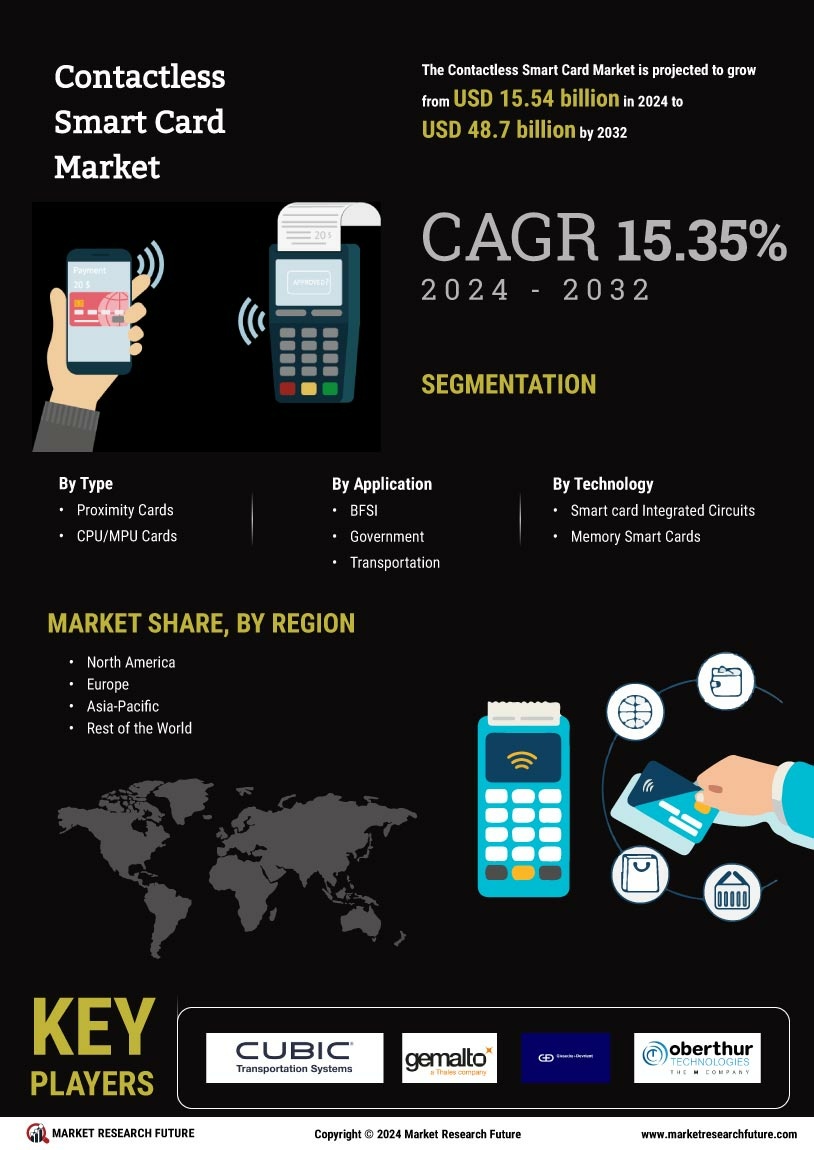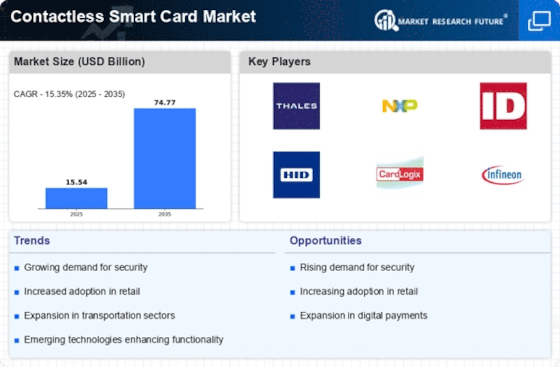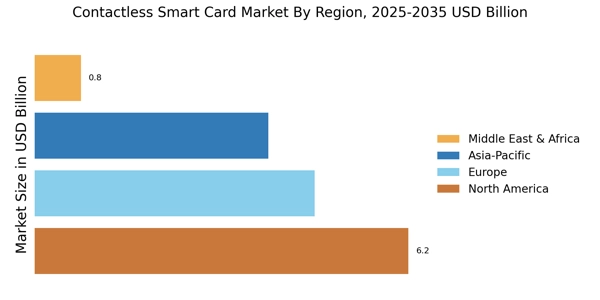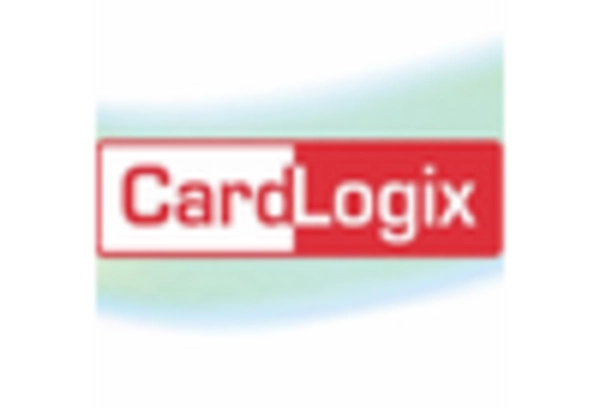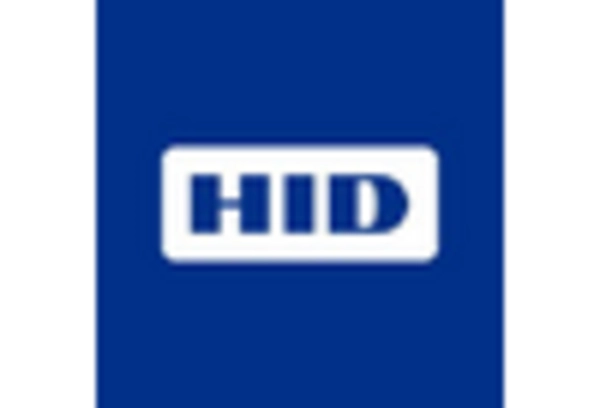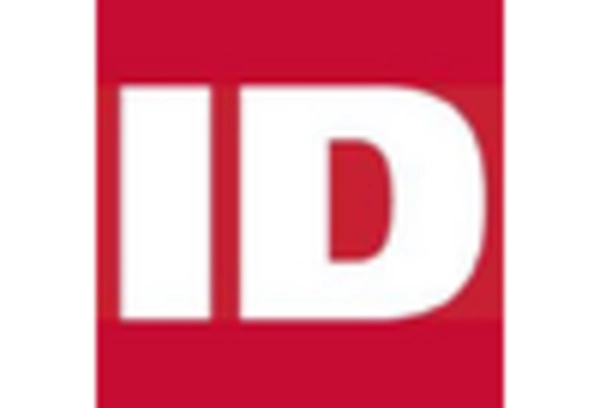Expansion of Smart City Initiatives
The expansion of smart city initiatives is driving the growth of the Contactless Smart Card Market. As urban areas increasingly adopt smart technologies to enhance infrastructure and services, the integration of contactless smart cards into public transportation systems and other municipal services is becoming more prevalent. These cards facilitate seamless access to various services, including transportation, parking, and public amenities, thereby improving the overall efficiency of urban living. Market analysis suggests that the investment in smart city projects is likely to increase, with many cities implementing contactless payment solutions to streamline operations. This trend not only enhances user convenience but also supports the broader goals of sustainability and smart governance. As cities continue to evolve, the demand for contactless smart cards is expected to rise, further solidifying their role in modern urban ecosystems.
Growing Demand for Contactless Payments
The increasing preference for contactless payment methods is a primary driver of the Contactless Smart Card Market. Consumers are gravitating towards faster and more convenient payment solutions, which has led to a surge in the adoption of contactless smart cards. According to recent data, the contactless payment segment is projected to grow at a compound annual growth rate of over 20% in the coming years. This trend is particularly evident in retail and e-commerce sectors, where speed and efficiency are paramount. As businesses seek to enhance customer experience, the integration of contactless smart cards into payment systems becomes essential. This shift not only streamlines transactions but also reduces the need for physical cash handling, thereby promoting hygiene and safety in financial exchanges. Consequently, the demand for contactless smart cards is expected to continue its upward trajectory.
Rising Consumer Awareness and Acceptance
Rising consumer awareness and acceptance of contactless technology is a significant driver for the Contactless Smart Card Market. As individuals become more informed about the benefits of contactless payments, including speed, convenience, and enhanced security, the adoption rate of contactless smart cards is likely to increase. Educational campaigns and marketing efforts by financial institutions and technology providers have played a pivotal role in shaping consumer perceptions. Recent surveys indicate that a substantial percentage of consumers are now more willing to use contactless payment methods compared to traditional ones. This shift in mindset is expected to foster a more favorable environment for the growth of the Contactless Smart Card Market. As acceptance continues to rise, manufacturers and service providers may find new opportunities to innovate and expand their offerings, catering to the evolving preferences of consumers.
Increased Focus on Security and Fraud Prevention
The heightened emphasis on security and fraud prevention is a crucial driver for the Contactless Smart Card Market. As digital transactions become more commonplace, the risk of cyber threats and fraud has escalated, prompting consumers and businesses to seek more secure payment options. Contactless smart cards are equipped with advanced encryption technologies and secure elements that protect sensitive information during transactions. Recent statistics reveal that the financial losses due to card fraud have prompted a shift towards more secure payment methods, with contactless cards being at the forefront of this transition. This growing concern for security is likely to propel the demand for contactless smart cards, as they offer a reliable solution to mitigate risks associated with traditional payment methods. Consequently, the Contactless Smart Card Market is expected to benefit from this trend as security becomes a top priority for users.
Technological Advancements in Card Manufacturing
Technological innovations in card manufacturing are significantly influencing the Contactless Smart Card Market. The introduction of advanced materials and production techniques has enhanced the durability and functionality of smart cards. For instance, the use of high-frequency RFID technology allows for quicker data transmission and improved security features. Additionally, the integration of biometric authentication methods, such as fingerprint recognition, is becoming more prevalent, thereby increasing the appeal of contactless smart cards. Market data indicates that the adoption of these advanced technologies is likely to drive the market growth, as consumers and businesses alike seek more secure and efficient solutions. Furthermore, the ongoing research and development efforts in this domain suggest that the Contactless Smart Card Market will continue to evolve, offering innovative products that meet the changing demands of users.
